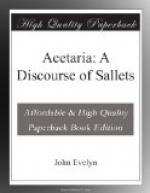Verily the Luxury of the East ruin’d the greatest Monarchies; first, the Persian, then the Grecian, and afterwards Rome her self: By what Steps, see elegantly describ’d in Old [118]_Gratius_ the Faliscian, deploring his own Age compar’d with the former:
O quantum, & quoties decoris frustrata paterni! At qualis nostris, quam simplex mensa Camillis! Qui tibi cultus erat post tot, serrane, triumphos? Ergo illi ex habitu, virtutisq; indole priscae, Imposuere orbi Romam caput:——
Neighb’ring Excesses being made
thine own,
How art thou fall’n from thine old
Renown!
But our Camilli did but plainly
fare,
No Port did oft triumphant Serran
bear:
Therefore such Hardship, and their Heart
so great
Gave Rome to be the World’s
Imperial Seat.
But as these were the Sensual and Voluptuous, who abus’d their Plenty, spent their Fortunes and shortned their Lives by their Debauches; so never did they taste the Delicaces, and true Satisfaction of a sober Repast, and the infinite Conveniences of what a well-stor’d Garden affords; so elegantly describ’d by the [119]_Naturalist_, as costing neither Fuel nor Fire to boil, Pains or time to gather and prepare, Res expedita & parata semper: All was so near at hand, readily drest, and of so easie Digestion; as neither to offend the Brain, or dull the Senses; and in the greatest Dearth of Corn, a little Bread suffic’d. In all Events,
Panis ematur, Olus, Vini Sextarius
adde
Queis humana sibi doleat natura negatis.
Bread, Wine and wholsome Sallets you may
buy,
What Nature adds besides is Luxury.
They could then make an honest Meal, and dine upon a Sallet without so much as a Grain, of Exotic Spice; And the Potagere was in such Reputation, that she who neglected her Kitchen-Garden (for that was still the Good-Woman’s Province) was never reputed a tolerable Hus-wife: Si vespertinus subito te oppresserit hospes, she was never surpriz’d, had all (as we said) at hand, and could in a Trice set forth an handsome Sallet: And if this was Happiness, Convictus facilis sine arte mensa (as the Poet reckons) it was here in Perfection. In a Word, so universal was the Sallet, that the [120]Un-bloody Shambles (as Pliny calls them) yielded the [121]_Roman_ State a more considerable Custom (when there was little more than honest Cabbage and Worts) than almost any thing bessides brought to Market.




